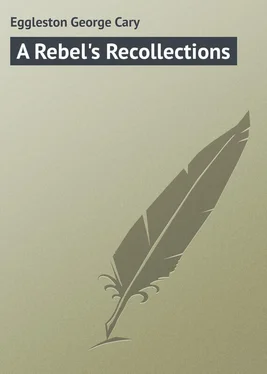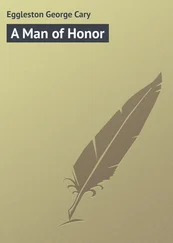George Eggleston - A Rebel's Recollections
Здесь есть возможность читать онлайн «George Eggleston - A Rebel's Recollections» — ознакомительный отрывок электронной книги совершенно бесплатно, а после прочтения отрывка купить полную версию. В некоторых случаях можно слушать аудио, скачать через торрент в формате fb2 и присутствует краткое содержание. Издательство: Иностранный паблик, Жанр: foreign_prose, на английском языке. Описание произведения, (предисловие) а так же отзывы посетителей доступны на портале библиотеки ЛибКат.
- Название:A Rebel's Recollections
- Автор:
- Издательство:Иностранный паблик
- Жанр:
- Год:неизвестен
- ISBN:нет данных
- Рейтинг книги:5 / 5. Голосов: 1
-
Избранное:Добавить в избранное
- Отзывы:
-
Ваша оценка:
- 100
- 1
- 2
- 3
- 4
- 5
A Rebel's Recollections: краткое содержание, описание и аннотация
Предлагаем к чтению аннотацию, описание, краткое содержание или предисловие (зависит от того, что написал сам автор книги «A Rebel's Recollections»). Если вы не нашли необходимую информацию о книге — напишите в комментариях, мы постараемся отыскать её.
A Rebel's Recollections — читать онлайн ознакомительный отрывок
Ниже представлен текст книги, разбитый по страницам. Система сохранения места последней прочитанной страницы, позволяет с удобством читать онлайн бесплатно книгу «A Rebel's Recollections», без необходимости каждый раз заново искать на чём Вы остановились. Поставьте закладку, и сможете в любой момент перейти на страницу, на которой закончили чтение.
Интервал:
Закладка:
CHAPTER I.
THE MUSTERING
That was an admirable idea of De Quincey's, formally to postulate any startling theory upon which he desired to build an argument or a story, and to insist that his readers should regard the postulate as proved, on pain of losing altogether what he had to say. The plan is a very convenient one, saving a deal of argument, and establishing in the outset a very desirable relation of mastery and subordination between writer and reader. Indeed, but for some such device I should never be able to get on at all with these sketches, fully to understand which, the reader must make of himself, for the time at least, a Confederate. He must put himself in the place of the Southerners and look at some things through their eyes, if he would understand those things and their results at all; and as it is no part of my purpose to write a defense of the Southern view of any question, it will save a good deal of explanation on my part, and weariness on the part of the reader, if I follow De Quincey's example and do a little postulating to begin with. I shall make no attempt whatever to prove my postulates, but any one interested in these pages will find it to his advantage to accept them, one and all, as proved, pending the reading of what is to follow. After that he may relapse as speedily as he pleases into his own opinions. Here are the postulates: —
1. The Southerners honestly believed in the right of secession, not merely as a revolutionary, but as a constitutional right. They not only held that whenever any people finds the government under which it is living oppressive and subversive of the ends for which it was instituted, it is both the right and the duty of that people to throw off the government and establish a new one in its stead; but they believed also that every State in the Union held the reserved right, under the constitution, to withdraw peaceably from the Union at pleasure.
2. They believed that every man's allegiance was due to his State only, and that it was only by virtue of the State's continuance in the Union that any allegiance was due to the general government at all; wherefore the withdrawal of a State from the Union would of itself absolve all the citizens of that State from whatever obligations they were under to maintain and respect the Federal constitution. In other words, patriotism, as the South understood it, meant devotion to one's State, and only a secondary and consequential devotion to the Union, existing as a result of the State's action in making itself a part of the Union, and terminable at any time by the State's withdrawal.
3. They were as truly and purely patriotic in their secession and in the fighting which followed, as were the people of the North in their adherence to the Union itself. The difference was one of opinion as to what the duties of a patriot were, and not at all a difference in the degree of patriotism existing in the two sections.
4. You, reader, who shouldered your musket and fought like the hero you are, for the Union and the old flag, if you had been bred at the South, and had understood your duty as the Southerners did theirs, would have fought quite as bravely for secession as you did against it; and you would have been quite as truly a hero in the one case as in the other, because in either you would have risked your life for the sake of that which you held to be the right. If the reader will bear all this in mind we shall get on much better than we otherwise could, in our effort to catch a glimpse of the war from a Southern point of view.
With all its horrors and in spite of the wretchedness it has wrought, this war of ours, in some of its aspects at least, begins to look like a very ridiculous affair, now that we are getting too far away from it to hear the rattle of the musketry; and I have a mind, in this chapter, to review one of its most ridiculous phases, to wit, its beginning. We all remember Mr. Webster's pithy putting of the case with regard to our forefathers of a hundred years ago: "They went to war against a preamble. They fought seven years against a declaration. They poured out their treasures and their blood like water, in a contest in opposition to an assertion." Now it seems to me that something very much like this might be said of the Southerners, and particularly of the Virginians, without whose pluck and pith there could have been no war at all worth writing or talking about. They made war upon a catch-word, and fought until they were hopelessly ruined for the sake of an abstraction. And certainly history will not find it to the discredit of those people that they freely offered themselves upon the altar of an abstract principle of right, in a war which they knew must work hopeless ruin to themselves, whatever its other results might be. Virginia did not want to secede, and her decision to this effect was given in the election of a convention composed for the most part of men strongly opposed to secession. The Virginians believed they had both a moral and a constitutional right to withdraw voluntarily from a Union into which they had voluntarily gone, but the majority of them preferred to remain as they were. They did not feel themselves particularly aggrieved or threatened by the election of Mr. Lincoln, and so, while they never doubted that they had an unquestionable right to secede at will, they decided by their votes not to do anything of the kind. This decision was given in the most unmistakable way, by heavy majorities, in an election which involved no other issue whatever. But without Virginia the States which had already passed ordinances of secession would have been wholly unable to sustain themselves. Virginia's strength in men, material, and geographical position was very necessary, for one thing, and her moral influence on North Carolina, Arkansas, and other hesitating States, was even more essential to the success of the movement. Accordingly every possible effort was made to "fire the heart" of the conservative old commonwealth. Delegations, with ponderous stump speeches in their mouths and parchment appeals in their hands, were sent from the seceding States to Richmond, while every Virginian who actively favored secession was constituted a committee of one to cultivate a public sentiment in favor of the movement.
Then came such a deluge of stump speeches as would have been impossible in any other state or country in the civilized world, for there never yet was a Virginian who could not, on occasion, acquit himself very well on the hustings. The process of getting up the requisite amount of enthusiasm, in the country districts especially, was in many cases a very laughable one. In one county, I remember, the principal speakers were three lawyers of no very great weight except in a time of excitement. One of them was colonel of the county militia, another lieutenant-colonel, and the third captain of a troop of volunteer cavalry, a fine body of men, who spent three or four days of each month partly in practicing a system of drill which, I am persuaded, is as yet wholly undreamed of by any of the writers upon tactics, and partly in cultivating the social virtues over that peculiar species of feast known as a barbecue. When it became evident that the people of Virginia were not duly impressed with the wrong done them in the election of Mr. Lincoln, these were unquestionably the right men in the right places. They were especially fond of fervid speech-making, and not one of them had ever been known to neglect an opportunity to practice it; each could make a speech on any subject at a moment's warning. They spoke quite as well on a poor theme as on a good one, and it was even claimed for one of them that his eloquence waxed hottest when he had no subject at all to talk about. Here, then, was their opportunity. The ever-full vials of their eloquence waited only for the uncorking. It was the rule of their lives to make a speech wherever and whenever they could get an audience, and under the militia law they could, at will, compel the attendance of a body of listeners consisting of pretty nearly all the voters of the county, plus the small boys. When they were big with speech they had only to order a drill. If a new gush of words or a felicitous illustration occurred to them overnight, they called a general muster for the next day. Two of them were candidates, against a quiet and sensible planter, for the one seat allowed the county in the convention, and the only difference of opinion there was between them was involved in the question whether the ordinance of secession should be adopted before or after breakfast on the morning of the first day of the convention's existence. One wanted coffee first and the other did not. On the day of election, a drunken fellow, without a thought of saying a good thing, apologized to one of them for not having voted for him, saying, "I promised you, Sam, – but I couldn't do it. You're a good fellow, Sam, and smart at a speech, but you see, Sam, you haven't the weight o' head ." The people, as the result of the election showed, entertained a like view of the matter, and the lawyers were both beaten by the old planter.
Читать дальшеИнтервал:
Закладка:
Похожие книги на «A Rebel's Recollections»
Представляем Вашему вниманию похожие книги на «A Rebel's Recollections» списком для выбора. Мы отобрали схожую по названию и смыслу литературу в надежде предоставить читателям больше вариантов отыскать новые, интересные, ещё непрочитанные произведения.
Обсуждение, отзывы о книге «A Rebel's Recollections» и просто собственные мнения читателей. Оставьте ваши комментарии, напишите, что Вы думаете о произведении, его смысле или главных героях. Укажите что конкретно понравилось, а что нет, и почему Вы так считаете.












